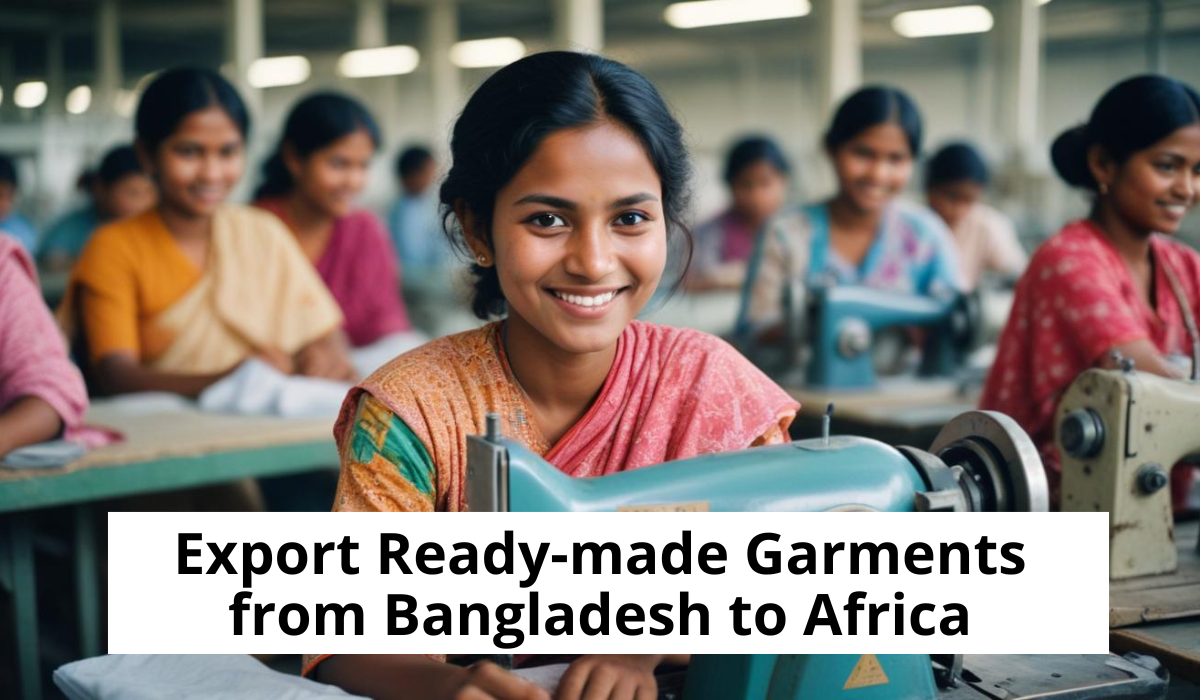
The economic relationship between Africa and Bangladesh is growing rapidly. This cooperation has created significant opportunities for businesses in both regions.
Bangladesh is known for its high-quality ready-made garments (RMG), and there is huge potential for these products in the African market. This guide will provide Bangladeshi garment exporters with a roadmap to successfully tap into Africa’s diverse market and expand their business.
The Golden Opportunity: Why Africa is the Next Frontier for Bangladeshi Garments
Africa is experiencing rapid growth in its economies. As countries continue to develop, there is a higher demand for apparel, especially in nations like South Africa, Kenya, Nigeria, and Egypt. This growth opens up many new investment opportunities for Bangladeshi businesses.
Countries like Nigeria, Kenya, and South Africa are some of the biggest importers of Bangladeshi garments. Additionally, the ECOWAS (Economic Community of West African States) countries represent a large market for export, offering excellent prospects for Bangladeshi exporters.
What to Export: In-Demand Garment Categories for the African Market
To succeed in the African market, it is important to know which types of garments are in high demand. Here are the top categories to consider:
1. Ready-Made Garments (RMG)
RMG remains the leading category of export from Bangladesh to Africa. African markets are eager to import ready-made clothing due to the growing demand for affordable fashion.
2. Knitwear and T-Shirts
Knitwear and T-shirts are popular, especially in countries with a younger population. Buyers in Africa are constantly looking for reliable manufacturers, making it a great opportunity for Bangladeshi T-shirt manufacturers.
3. Denim Products
Denim, including jeans and denim fabric, is another high-demand product. Africa’s growing middle class is increasingly interested in affordable, quality denim.
4. Low-Cost Clothing for Import
Affordable clothing is in high demand, especially in countries with a significant lower-income population. Low-cost clothing for import can target this specific market segment effectively.
5. Custom Clothing
Some businesses in Africa seek custom clothing for their local markets. Offering bespoke manufacturing services allows Bangladeshi exporters to meet the unique needs of these buyers.
How to Export Garments to Africa from Bangladesh: A Step-by-Step Guide
Step 1: Market Research & Identifying Opportunities
The first step in entering the African market is market research. You need to understand the demand for Bangladeshi products in different African countries. Some key countries for exporting garments, textiles, and RMG include:
- South Africa
- Egypt
- Kenya
- Nigeria
These countries are actively seeking suppliers for garments and textiles. Researching the specific needs of these markets will help you make informed decisions.
Step 2: Finding African Buyers & Importers
Finding reliable African importers can be a challenge. However, connecting with the right buyers is crucial for success. This can be done through B2B matchmaking events and trade fairs. These platforms offer a chance to meet African buyers looking for Bangladeshi suppliers.
Step 3: Understanding Documentation & Compliance
Before shipping goods, it is essential to understand the export-import documentation and compliance requirements. Proper paperwork ensures smooth transactions and delivery. Partnering with organizations like the Africa Bangladesh Business Forum (ABBF) can help streamline this process.
Step 4: Logistics and Shipping
Shipping garments from Dhaka and Chattogram to African countries requires planning. Shipping routes may pass through Middle Eastern transit markets. It’s important to choose reliable shipping partners who can handle your goods efficiently.
Step 5: Securing Payment
Securing payment is a key concern when exporting goods. Common methods include letters of credit and bank transfers. Ensure that the transactions are secure to protect both you and your buyers. It is highly recommended to use the advanced T/T (wire transfer) before shipment or onboarding the products. Marketplaces like Kingmansa could be a good alternative to traditional banking methods to facilitate payments.
Overcoming Challenges in the Africa-Bangladesh Trade Route
Despite the opportunities, there are challenges in the Africa-Bangladesh trade route. These include logistical issues, the need to find verified buyers, and market regulations that vary across African countries. However, these challenges can be managed with the right approach and strategic partners.
Partnering with a trusted platform like the Africa Bangladesh Business Forum (ABBF) can help overcome these challenges by providing verified buyers and simplifying the process of doing business across borders.
How the Africa Bangladesh Business Forum (ABBF) Fuels Your Export Journey
Introduction to ABBF
The Africa Bangladesh Business Forum (ABBF) is the leading B2B platform dedicated to facilitating trade between Bangladesh and Africa. ABBF connects Bangladeshi exporters with African importers, helping businesses grow and succeed in the African market.
Connecting You with Buyers
ABBF offers a unique opportunity to meet reliable buyers across Africa. Through its verified network, ABBF connects African importers with Bangladesh exporters. This platform helps you find the right partners, making the export process smoother.
A Trusted B2B Marketplace
ABBF is a trusted Bangladesh-Africa B2B marketplace that fosters both commercial and transactional connections. It is designed to help you establish long-term business relationships and expand your market reach.
Facilitating Partnerships
ABBF is not just about connecting buyers and sellers. The platform also focuses on creating joint ventures between African and Bangladeshi businesses. This helps create sustainable partnerships that can last for years.
Call to Action
Join the Africa Bangladesh Business Forum (ABBF) today to start your export journey to Africa. With access to trade fairs, business forums, and a network of reliable partners, you will be well-equipped to grow your business and succeed in the African market.
Book a CallFrequently Asked Questions (FAQ)
Q1. How can I find reliable African buyers for Bangladeshi garments?
Answer: Platforms like the Africa Bangladesh Business Forum (ABBF) and BGMEA‑led trade fairs, roadshows, and B2B matchmaking events offer access to verified importers in key markets like Nigeria, Kenya, South Africa, and Egypt. These channels reduce the risk of payment defaults and ensure smoother business partnerships.
Q2. Which African countries offer the best opportunities for Bangladeshi RMG exports?
Answer: Nigeria, Kenya, South Africa, and Egypt consistently import high volumes of Bangladeshi RMG. These markets show strong consumer demand, expanding middle classes, and greater retail infrastructure—making them ideal targets for garment exporters.
Q3. What incentives and support does the Bangladeshi government provide for exporting to Africa?
Answer: Exporters benefit from the Export Policy 2021–24, which includes cash incentives (up to 4 % or more if entering new markets or products), tax breaks, duty-free raw material imports, and infrastructure support. Initiatives like the African Investment Initiative and trade forums further facilitate market entry.
Q4. Why is Bangladesh focusing on garment exports to African markets?
Answer: To reduce over-reliance on traditional markets like the U.S. and EU—where demand volatility and trade barriers are increasing—Bangladesh is expanding into emerging regions such as Africa. Diversifying markets helps stabilize export earnings and capture new opportunities in growing economies.
Q5. What other sectors beside RMG are growing between Bangladesh and Africa?
Answer: Beyond apparel, Bangladesh also imports over 50 % of its cotton from Africa, and exports other products like pharmaceuticals, jute products, ceramics, and IT services. Additionally, export of RMG accessories (e.g. packaging, labels) is expanding to African buyers. These sectors support diversification in bilateral trade.
Conclusion
The opportunity for Bangladeshi RMG exporters in Africa is immense. The growing demand for garments, coupled with investment opportunities, makes Africa the perfect market for expansion. Although there are challenges, they are manageable with the right strategy and partnerships.
Ready to start your export journey to Africa? Partner with the Africa Bangladesh Business Forum (ABBF) today to connect, trade, and grow your business.

